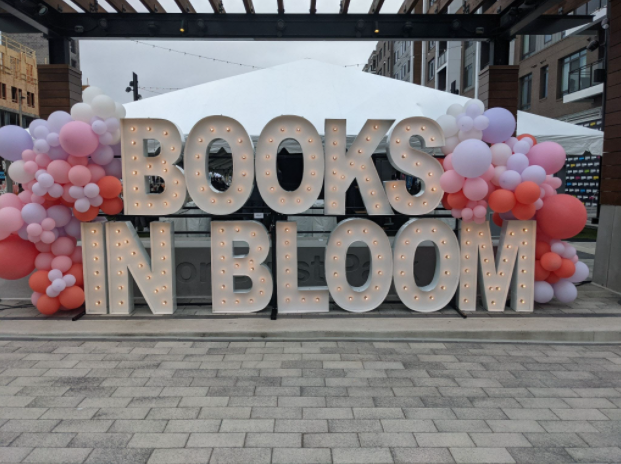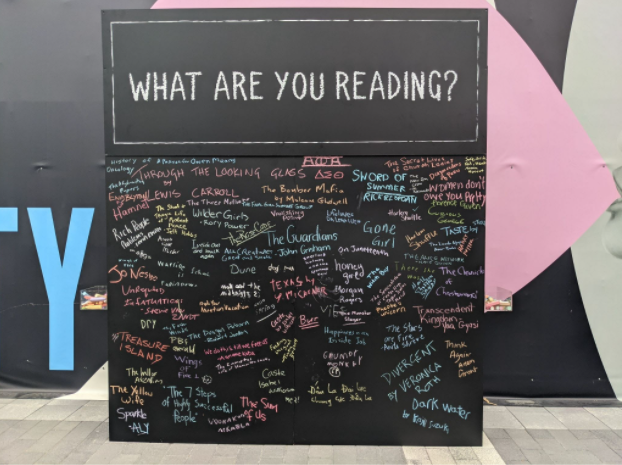Nikole Hannah-Jones makes a special appearance at the fifth-annual literary festival Books in Bloom
Nikole Hannah-Jones talking with Busboys and Poets owner Andy Shallal about her work (Aaron Wright/The Black Explosion)
Nikole Hannah-Jones made a guest appearance at the annual literary festival Books in Bloom to talk about journalism, race and the 1619 Project in front of hundreds of audience members on Sunday.
Nikole Hannah-Jones is a Pulitzer Prize-winning journalist, who created the 1619 Project, which seeks to recontextualize American history by placing the contributions of Black Americans at the forefront of this nation’s narrative, according to The New York Times Magazine. “The 1619 Project: A New Origin Story,” the book based on the project, will launch on Nov. 16.
The Books in Bloom is one of Columbia, Maryland’s annual book fairs. It launched in 2017 with the goal of being an expression of Columbia’s love for reading, diversity and inclusion, according to Books in Bloom’s website.
The year’s event held many different activities that allowed visitors to make their own journals and bookmarks, purchase books from the Busboys and Poets’ popup book store and listen to a wide variety of guest speakers. However, there was one speaker whom many were excited for, which included one family that wore “The 1619 Project” tee shirts.
“I don’t know much about [Books in Bloom], but [Hannah-Jones] brought us out here today,” said Carla Conward, a University of Maryland alumna who graduated in 2001 with a degree in criminology and criminal justice.
A display for the Books in Bloom literary festival in Columbia, Md. (Aaron Wright/The Black Explosion)
Conward, with her family and four kids, came to Books in Bloom to talk to others about The 1619 Project, as well as the importance of it in her life.
“I have four Black kids that I’m raising and I do not want them to be raised with the knowledge that I had growing up in public schools. The knowledge I was given was not a broad knowledge or the truth of who we are as Black people. This is the reason why I’m here so that I can give more information to pass onto them,” said Conward.
More than 200 people gathered under and around the main pavilion where Hannah-Jones would have a conversation with the founder and owner of Busboys and Poets Andy Shallal. When she arrived at the stage, the crowd erupted in cheers and applause.
“You know, I think we all were familiar with her work. We’re all really excited about what she brings to the event,” said Phillip Dodge, executive director of the Downtown Columbia Partnership, which organizes the festival.
Before Hannah-Jones and Shallal began their conversation, Baltimore poet and author Marc Marcel opened for them, in a series of spoken word poems, which garnered many snaps, applause and served as a way to set the mood.
“I’m outspoken, word artist, hanging from a tree with my tongue cut out. White boys could never be like me. This isn’t poetry, it’s just my lifestyle. Don’t matter if you lift bro. Your tiki torches and pick-up trucks don’t scare me. Just tempts me to get on some John Brown type s***,” said Marcel in a spoken word dedicated to Hannah-Jones.
The conversation began shortly after and focused on the depiction of Black Americans within American history.
“What does the preservation of Blackness mean to you, and why is it important?” asked Shallal.
“I think I spent my entire career trying to place Black people properly in the narrative of America. We have been treated either as a problem, obsessed over as a problem or marginal to the story as an asterisk to the American story. As recipients to the American story, but not actors to the American story,” said Hannah-Jones.
Baltimore native Marc Marcel performs poetry for the audience as Nikole Hannah-Jones and Busboys and Poets owner Andy Shallal watches from behind. (Aaron Wright/The Black Explosion)
From there, Hannah-Jones gave incredible insight into the 1619 Project, what it means to preserve Blackness, objectivity in journalism, and the role Black Americans have in American history.
“History is both the facts and who told those facts,” said Hannah-Jones. “We can’t look at inequalities today unless we look back to slavery and anti-Blackness.”
During Hannah-Jones' speech, she also shared the anxiety she experienced on whether or not the 1619 Project would succeed as she was making it in 2019. Hannah-Jones said that if the project failed, it closes the door of opportunity for Black and Brown people who wanted to pitch something akin to the 1619 project. However, it would prove to be wildly successful.
“There’s a picture in September of 2019 of people waiting in line at the New York Times headquarters to pick up a copy of the ‘1619 Project’,” said Shallal.
After the conversation between Hannah-Jones and Shallal finished, the audience could ask questions to Hannah-Jones. The topics ranged from the intersection of women’s liberation and Black liberation, whether she has hope for this country and her thoughts on confederate statues being taken down.
Wall of books that Back in Bloom attendees are reading (Aaron Wright/The Black Explosion)
“When it comes to confederates and overall bigots, we should just tear that s*** down, all of it,” said Hannah-Jones.
Black Explosion Newspaper’s reporter Aaron Wright was among those who asked a question, relating to the plight of Black and minority journalists across the country.
“How can Black and minority journalists navigate reporting despite the lack of access that we have?” Wright asked.
“Always use that as motivation to find another way, to shine another way, because that’s always going to be the role that we have to play. They’re never gonna open doors for us in the same way right? We’re gonna have to open as James Brown said … open those doors ourselves and ask nobody to give me nothing,” said Hannah-Jones.




